In this edition of Bright Founders Talk at Temy, we sit down with Duncan Weatherston, the visionary CEO and co-founder of Smile Digital Health. With nearly a decade of experience driving innovation in healthcare technology, Duncan shares how his passion for building impactful systems led to the creation of a transformative data platform.
Smile Digital Health is at the forefront of enabling semantic and structural interoperability, ensuring health information is both consistent and computable across diverse sources. From laboratory results to long-term care data, Duncan’s platform makes critical health data accessible and actionable at scale. He explains how their technology empowers clinicians, payers, and policymakers to make faster, more informed decisions by converting policies into AI-powered, computable logic.
Duncan’s entrepreneurial spirit emerged early—launching his first business at 18—and his journey reflects a commitment to solving real-world problems through software. During our conversation, he also reveals how previous frustrations with legacy systems shaped his determination to build something better. Join us as we explore Duncan’s path, his bold vision for the future of digital health, and what it takes to lead innovation in a highly complex industry.
From Frustration to Innovation: How Duncan Is Rewiring Healthcare with Code
Duncan didn’t exactly stumble into healthcare tech—he bulldozed his way in with purpose. Years of watching hospital systems fail to scale pushed him to ask: why are we still duct-taping outdated software in an age of AI and cloud computing? “We were constantly writing our own layer in front of what we bought,” he says. So, instead of accepting broken tools, Duncan and his team built their own from the ground up. Smile Digital Health was born not just out of inspiration, but out of necessity. What started as a platform to make clinical data usable quickly evolved into something far more powerful.
At the heart of Smile’s mission is interoperability—not the sexiest term, but one that Duncan makes compelling. Think of it like translating dozens of dialects into one shared language doctors, systems, and machines all understand. That means lab results, prescriptions, and patient histories can actually talk to each other. The result? Smarter decisions, faster care, and fewer errors. On top of that, Smile built a clinical reasoning engine that’s basically the brain on top of the data body. “We’re making health information computable,” Duncan explains—because what good is data if no one can use it?
We’re making health information computable
And here’s where things get even more sci-fi: Smile has now woven AI into the mix to convert real-world healthcare policies into working code—instantly. Imagine a health guideline written by a government body turning into executable logic with the click of a button. That’s the kind of game-changer Duncan believes can redefine modern care. But even with all this high-tech firepower, his mission stays grounded: “I just want the world to be a better place because I was here.” Simple. Human. And exactly what healthcare needs.
Healthcare That Actually Helps: Duncan’s Vision for Smarter, Human-Centered Care
For Duncan, improving healthcare isn’t just about making things faster—it’s about making them smarter for everyone involved. That means understanding how a chronic illness like a heart condition doesn’t just impact the person diagnosed, but also their clinicians, families, and daily life. Traditional systems treat patients as occasional visitors. But in reality, patients live with their conditions every single day. “From a patient’s perspective, it's a day-to-day interaction,” Duncan explains. He believes technology should adapt to that reality—by giving people the tools to manage their health in real time, not just during doctor’s visits.
From a patient’s perspective, it's a day-to-day interaction
He paints a future where your health app knows you better than your calendar. You wake up, check your phone, and see clear, actionable insights: Are you trending in the right direction? What’s your next step? If something’s off, you can alert your doctor with a tap—and your care team knows exactly what to do. That’s the kind of personal, responsive healthcare Duncan is building. And it’s not just for the privileged few. His platform is already supporting healthcare delivery in over 20 countries, many of which don’t have access to consistent medical resources. With AI-powered insights, even basic smartphones become lifelines.
What’s most compelling is how inclusive Duncan’s approach is. In areas where doctors are scarce, his platform makes it possible to train nurses or even empower family members to gather and share health data. Using everyday devices like mobile phones, communities can build decentralized care systems that are both smart and scalable. “We’re not just giving information—we’re making it meaningful and usable,” Duncan says. In his world, healthcare doesn’t stop at the hospital. It lives with you, supports your family, and grows with your community.
“Share It All, Keep It Secret”: Duncan on the Paradox of Healthcare Security and the Real Role of AI
Healthcare, Duncan reminds us, is full of contradictions. We demand privacy—then turn around and expect every doctor, nurse, and specialist to magically have the full picture. "The weird conflict is: it’s absolutely private, but share it with everybody who needs to know,” he says with a laugh. That tension, between secrecy and accessibility, is exactly what Smile Digital Health is designed to solve. Instead of locking down data behind a thousand digital walls or, worse, opening the floodgates without guardrails, Smile’s platform finds the sweet spot. Their approach is layered with zero trust architecture and deep operational controls, ensuring security without blocking care. Because in the end, as Duncan puts it, too much lockdown is just as dangerous as too little.
The weird conflict is: it’s absolutely private, but share it with everybody who needs to know
When asked about working across borders, Duncan doesn’t flinch. Yes, global healthcare is messy—legislation, access, and cultural norms all clash—but the biology? That’s consistent. "We all have hearts and lungs," he jokes, "but some places still risk violence for giving vaccines.” For Smile, adapting to local rules while maintaining a global standard isn’t a burden—it’s the mission. And thanks to the flexibility of their tech, they’ve managed to deliver value from Canada to communities with little more than a smartphone and a willing nurse. It’s not just about data. It’s about making that data useful in a hundred different languages and legal systems.
As for AI? Duncan’s excited, but he’s no hype man. For him, it’s the next logical step in computing—just like going from punch cards to Python. He sees AI as a tool, not a miracle. Smile uses it to translate human-written healthcare policies into executable code, helping providers respond faster and smarter. But Duncan is crystal clear: “AI is powerful, yes—but it’s not magic.” In a world that often swings between paranoia and blind faith in tech, his grounded perspective is a refreshing dose of clarity.
From AI to Adversity: Duncan’s Blueprint for Smarter Healthcare and Stronger Founders
Duncan’s take on AI in healthcare isn’t clouded by buzzwords or utopian fantasies—it’s grounded, technical, and surprisingly human. For him, AI isn’t about replacing doctors or inventing miracles. It’s about reducing error, streamlining decision-making, and giving both patients and providers better tools. “AI makes mistakes—just like we do,” he says, “so we use it where it helps most: figuring out what to do next.” At Smile Digital Health, that means using AI to interpret complex patient data, generate actionable care pathways, and make those decisions computable—fast. It’s like giving the system a brain and a calculator, one that doesn’t burn out or forget the details.
AI makes mistakes—just like we do
But beneath all the logic models and medical algorithms lies Duncan’s personal fire for entrepreneurship. When asked what advice he’d give to first-time founders, his response is brutally honest—and oddly reassuring. “If you can count your mistakes, you haven’t made enough,” he grins. For Duncan, failure isn’t optional; it’s part of the blueprint. Starting a company, he explains, isn’t just a career move—it’s an emotional rollercoaster. You’ll lose sleep. You’ll question everything. You’ll carry the weight of your team on your shoulders. But if you’re prepared, if you walk into it with open eyes and an open heart, you’ll also unlock a kind of freedom and purpose that’s hard to find anywhere else.
He compares running a business to owning a home. Not because it’s cozy or simple, but because you finally get to decide what goes on inside the walls. It’s your space to shape, to fail in, to build something meaningful. Whether it’s transforming global healthcare through AI or inspiring the next generation of bold thinkers, Duncan isn’t just talking about innovation—he’s living it. And his message to future founders? Go for it. But bring a helmet.




